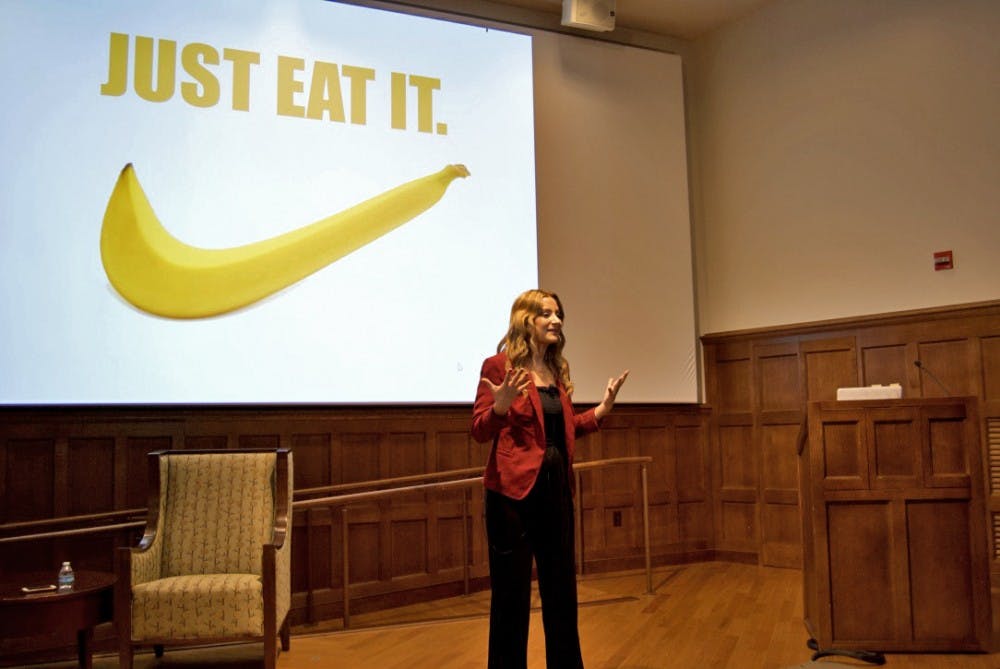A student, who one year before was too weak to even walk across campus, took the stage in a fully packed Ukrop Auditorium, strong and determined to bring a change to the face of eating disorders.
Junior Alex Carroll addressed this sensitive topic by sharing her own struggle with anorexia on Friday, Oct. 19.
“I am here to break the stigma that eating disorders and mental illness in general are something to be ashamed of or taboo,” she said.
There are many stereotypes and misconceptions that surround eating disorders, Carroll said. When people think about someone with an eating disorder, most times they will envision an emaciated young, white female, Carroll said.
Before Carroll’s talk, senior Alex Feldman subconsciously associated eating disorders with an issue seen mostly in thin females, he said.
Eating disorders don’t discriminate, Carroll said. It is hard to judge whether someone struggles from one just by looking at them because there is not a single type or mold that fits all of the different eating disorders.
Carroll shared a photograph of herself from last fall when she weighed less than 90 pounds. A year later, despite being back to a healthy state, Carroll said she still found herself mentally struggling at times, which is a large part of having an eating disorder.
"Ed" is a term commonly used to refer to the inner being of one’s eating disorder. Carroll said Ed was “an abusive guy who lives inside of my head. He’s the one telling me what I can and can’t do in relation to food and in general.”
Carroll would hear voices in her head telling her she was disgusting when she would eat more than the calories she allowed herself to consume in a day, she said.
“It took me until the very end of August to realize that the voice wasn’t me talking anymore," Carroll said. "That was Ed.”
Sophomore Sydney Shah had never heard someone talk about eating disorders as being controlled by someone else. Hearing it come from someone who knew Ed first-hand helped Shah understand what was occurring mentally, she said.
One of Shah’s friends from home struggled with a disorder similar to Carroll’s.
Enjoy what you're reading?
Signup for our newsletter
“I never understood why she felt the need to deprive herself," Shah said. "Now I can see that it wasn’t really my friend that was making that decision, but the disorder."
In an attempt to help others better understand the control Ed has over someone with an eating disorder, Carroll projected three different images on the screen. She asked the audience members to raise their hands if they saw one thing as opposed to another.
With the third and final image, Carroll asked the crowd to raise their hand if they saw a banana. Every single hand in the auditorium went up. The next slide showed what she saw when looking at the banana: 105 calories, with red sirens – a symbol for her anxiety.
Carroll saw almost all foods as a number of calories, opposed to what they actually are --something to eat. Senior Clay Campbell never understood the extent to which an eating disorder can alter one’s mental health, he said.
At the worst point of Carroll’s anorexia, she was eating only 40 calories a day. It’s shocking to compare that in terms of the banana– that’s a little more than eating a third of it, Campbell said.
Carroll’s talk made an impact on many people, said Carroll's therapist at UR, Charlynn Small.
"It was the way that she talked about it and taking the stigma away, saying ‘It’s okay to talk about it and it’s okay to have an eating disorder and it’s okay to get help,’" said Karen Hensley, UR registered dietician. "She was so open and inviting, yet so caring and genuine."
For Feldman, Carroll’s talk was a moment of realization, he said. His original view on eating disorders was that they were strictly driven by a desire to change one’s body image, he said. It became clear to him that it was so much more than that when Carroll described hers as a competition against herself to eat less than the day before, Feldman said.
Small and Hensley both sat in the crowd, proud to see how far Carroll had come. “We knew her when she was 85 pounds, so to see her now, flourishing, and now an ambassador – that’s what she really is,” Small and Hensley said, talking over one another.
One of the first people to show concern for Carroll’s health last year was her sorority sister, junior Caroline McCartney. Along with McCartney, many others in Carroll’s sorority, Kappa Delta, showed support at the talk, sitting in the front row and cheering her on.
“I look at her every day, and I’m so proud of her," McCartney said with tears in her eyes. "Seeing her last year was one of the hardest things. Being able to sit with her through lunch and dinner and seeing her so happy is so amazing.”
Small described Carroll as a therapist’s dream for eating disorders because unlike many other patients, she wanted to get well. Carroll said she hoped her openness would continue to encourage others to speak out, to be cognizant of others and to not be ashamed.
Contact contributor Kaori Tachibana at kaori.tachibana@richmond.edu.
Support independent student media
You can make a tax-deductible donation by clicking the button below, which takes you to our secure PayPal account. The page is set up to receive contributions in whatever amount you designate. We look forward to using the money we raise to further our mission of providing honest and accurate information to students, faculty, staff, alumni and others in the general public.
Donate Now



